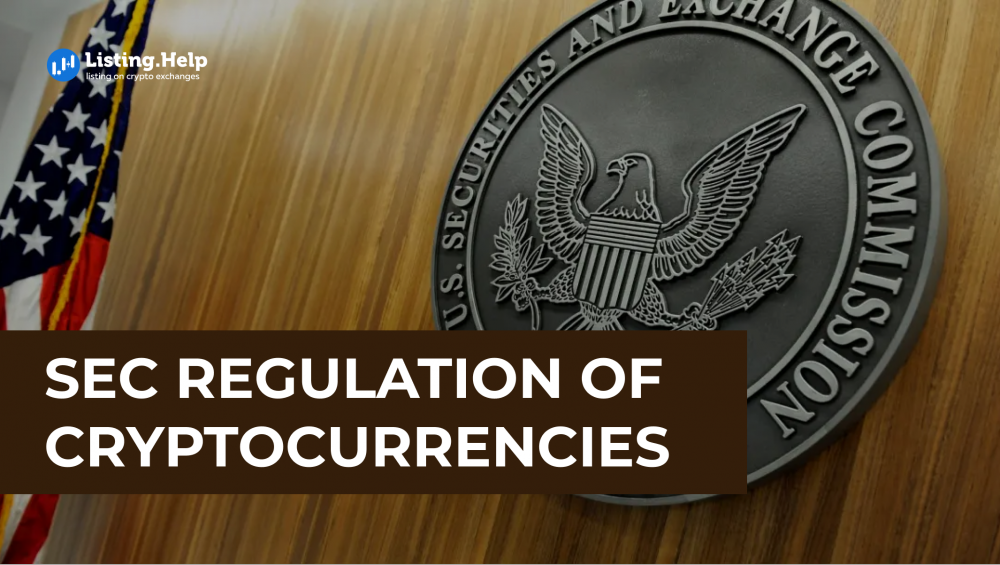How Does The SEC Regulate Crypto?
 May 16, 2024
May 16, 2024 Updated: January 27 2025, 06:49
Updated: January 27 2025, 06:49
LEAVE A REQUEST
Launching your own token project? Our experts are ready to help with listing on exchanges, market making, marketing and other solutions
SUBMIT APPLICATIONThe rise of cryptocurrency technology has led to significant advancements in financial systems worldwide, transforming traditional payment methods. However, practical issues with digital currencies have sparked discussions about regulation, especially by prominent organizations like the U.S. Securities and Exchange Commission (SEC).
This article will explain the role of the SEC and its connection to the crypto market. We will explore the main reasons behind the agency’s decision to regulate these assets and the potential impact of these regulations. Finally, we will discuss the future of this sector under the SEC’s oversight.
What is the SEC?
The Securities and Exchange Commission (SEC) is a U.S. government agency responsible for regulating the stock market. Its main role is to ensure transparency in transactions and combat fraudulent schemes, thereby maintaining investor confidence. To achieve this, the SEC sets rules for registering securities and oversees compliance. It also monitors stock and bond circulation, brokers’ activities, private investors’ trades, and investment companies, as well as addressing issues like market bubbles and manipulation. The SEC is concerned with all securities operations within the United States.
With considerable authority in the economic sector and an independent judicial system, the SEC handles the most complex legal disputes in the market. Its regulatory tools and methods serve as a model for international regulators. Any company with shares traded on U.S. exchanges falls under SEC oversight. Violations related to securities turnover or investor services, such as refusing to provide financial information to regulators, can trigger an SEC investigation.
The advent of cryptocurrency technologies has drawn increased attention from criminal and fraudulent groups, including those developing hacking tools targeting crypto infrastructure. This has led the SEC to develop measures to control and regulate the crypto market, particularly concerning trading on crypto exchanges. The SEC’s plans also include monitoring illegal activities like money laundering and funding criminal organizations.
Potential SEC Actions on Crypto
The SEC has various regulatory tools to address the distinct features and challenges of cryptocurrencies. Here are some ways the SEC might regulate the crypto market:
1. Registration Requirements: The SEC might require cryptocurrency exchanges and tokens to register. This would ensure these platforms and their offerings meet the same disclosure, reporting, and operational standards as traditional financial entities.
2. Disclosure Standards: The SEC could implement strict transparency rules, ensuring crypto companies provide investors with detailed and accurate information about their financials, business operations, and associated risks.
3. Anti-Fraud and Price Manipulation Measures: Enforcing anti-fraud rules to prevent deceptive practices and protect the integrity of crypto markets. This includes curbing activities like wash trading and pump-and-dump schemes.
4. Investor Education and Protection: The SEC could enhance efforts to inform investors about the specific risks of cryptocurrencies. It could also establish mechanisms to address investor grievances and disputes, boosting confidence in the market.
5. Cybersecurity Regulations: Given the digital nature of cryptocurrencies, the SEC might impose strict cybersecurity rules on crypto platforms to safeguard against hacks and data breaches.
6. AML and CTF Regulations: Working with other regulators to enforce anti-money laundering (AML) and counter-terrorism financing (CTF) regulations to address public security concerns related to cryptocurrencies.
7. Market Surveillance: Monitoring trading activities to detect irregularities early, ensuring a fair and transparent market.
8. Global Regulatory Cooperation: Collaborating with international regulators to create coordinated regulations, helping to combat cross-border crypto crimes and providing a consistent regulatory approach.
9. Innovation-Friendly Regulations: Implementing a balanced approach that encourages innovation while protecting investors and market integrity. This could include regulatory sandboxes for experimentation and feedback.
10. Clearer Tax Guidelines: Offering straightforward policies on taxing crypto transactions, in collaboration with the Internal Revenue Service and state tax authorities, to reduce uncertainty for investors and participants.
Aspects of the Crypto Market Open to Regulation
Regulators worldwide are working to create rules that balance innovation with consumer protection and market integrity in the crypto markets. Here are various market segments and how regulations might apply:
1. Cryptocurrencies like Bitcoin: As the most recognized cryptocurrency, Bitcoin could face regulations focusing on its use as a currency or a commodity.
2. Utility Tokens: These tokens provide access to products or services within a blockchain-based platform. Regulations could clarify which tokens are considered securities and enforce consumer protection laws.
3. ICOs: Similar to initial public offerings in the crypto space, ICOs have been scrutinized for bypassing traditional securities regulations. New rules might ensure proper disclosures and enhance investor protection and anti-fraud measures.
4. NFTs: These tokens represent ownership or proof of authenticity for unique items using blockchain technology. Regulations might require provenance verification, address intellectual property rights, and classify certain NFTs as securities.
5. DAOs: Operating through smart contracts on a blockchain, DAOs enable collective and automated decision-making. Regulations could require them to register as securities to address governance and liability issues.
6. Stablecoins: Often pegged to fiat currencies or other assets, stablecoins have attracted attention for their potential to reduce the volatility associated with cryptocurrencies. Regulations might cover reserve management, disclosure practices, and treat some exchanges as banks. For instance, Tether (USDT), the largest stablecoin, faced fines and settlements over allegations of misrepresenting its reserves.
7. Crypto Exchanges and Wallets: These platforms facilitate the buying, selling, and storing of cryptocurrencies. Regulations might focus on improving AML and CTF measures, cybersecurity protocols, and consumer protection. Exchanges might need to register as broker-dealers and comply with SEC oversight, including audit compliance and strict rules on order execution to prevent market manipulation.
8. Crypto Lending and DeFi Platforms: Regulations could address licensing and consumer protection, ensuring DeFi platforms and crypto lending ventures adhere to AML and CTF laws.
9. Crypto Asset Management: Managing crypto assets for investors involves navigating complex regulatory environments, potentially requiring compliance with securities laws and other financial regulations.
10. Cross-Border Transactions: Given the global nature of the crypto market, international cooperation could help harmonize regulations across different jurisdictions to combat illicit activities.
Regulation and Crypto ETFs
Crypto ETFs are pooled investments that track digital asset markets and are traded like shares on stock exchanges. They offer several advantages over other investment vehicles like debt-based exchange-traded products (ETPs) or investment trusts, which were previously approved for cryptocurrencies. Regulated under the Investment Company Act of 1940, these funds provide more investor protection and transparency than ETPs or trusts. They also offer greater liquidity, as they can be bought and sold on stock exchanges throughout the day, and typically have lower fees.
The first regulated crypto funds in the U.S. were futures-based Bitcoin and Ether (ETH) ETFs, which invest in futures contracts traded on U.S. exchanges. These funds give investors indirect exposure to cryptocurrency price movements without requiring them to own or store the actual assets. However, futures-based ETFs may not perfectly track the spot price of the cryptocurrency due to rolling costs and other factors.
A spot Bitcoin ETF, which directly holds the underlying cryptocurrency, provides investors with direct exposure to the spot price. This type of fund is preferred because it offers a more straightforward and cost-effective way to invest in digital currencies, avoiding the complexities of futures-based products. Spot ETFs make it easier for both institutional and retail investors to access digital assets through their traditional brokerage accounts.
In early 2024, the SEC approved the first spot Bitcoin ETFs, following pressure from a 2023 court ruling. However, the SEC is still reviewing applications for spot Ether ETFs. Concerns over Ethereum’s proof-of-stake consensus mechanism and the potential classification of ETH as a security need to be addressed before approval.
SEC Regulation of Cryptocurrencies
When a cryptocurrency qualifies as an investment contract, the SEC mandates its registration as an investment, bringing it under regulatory oversight. This applies to offerings made to institutional investors as well.
In its announcements of settlements with crypto exchanges, the SEC has stressed its openness to collaboration with compliant industry participants. SEC Chair Gary Gensler has highlighted the aim of extending investor protections, which have long been a foundation of U.S. securities markets, to the crypto sector. The increasing number of regulatory settlements by cryptocurrency companies indicates that this message is being heard.

For more insights into blockchain and cryptocurrency landscape, visit our blog at https://listing.help/blog







 January 28, 2026
January 28, 2026 








